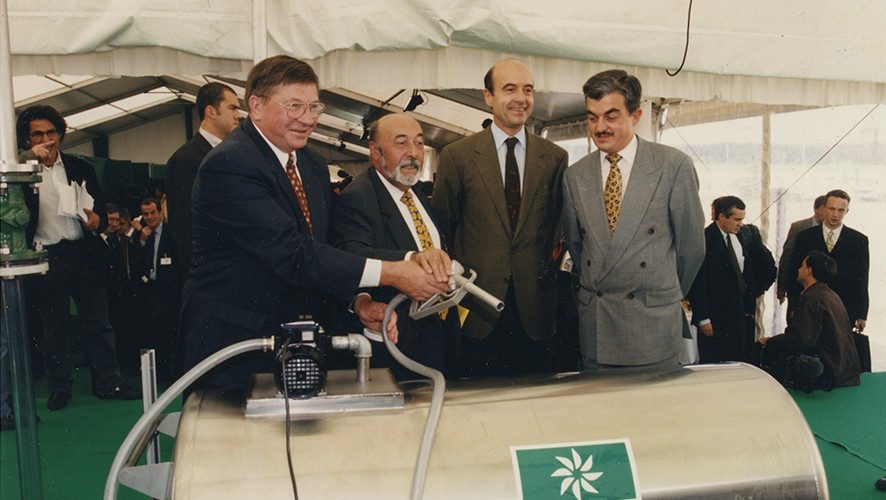1993-2006
Sofiprotéol, leading oilseed group in France & major biofuel player in Europe
1997
Creation of Biogemma, specialized in plant genomics, with Limagrain, Euralis and Unigrains
1998
Acquisition of a stake in Glon Sanders (animal nutrition)
2000
Xavier Beulin becomes the new Group CEO
2003
Takeover of Lesieur, leading French producer of edible oils
2004
Acquisition of the Puget brand
A sector being constantly structured, driven by Sofiprotéol
Upstream involvement in the seed sector
Aware that research to improve crop yields was of crucial importance, Sofiprotéol started to support genetic research on seeds. The Group thus took stakes in various companies in the sector, including Biogemma, specialized in plant genomics and founded in 1997 with Limagrain, Euralis and Unigrains.
Joint development of biofuels and the oleochemistry activity
To support development of biofuels, Sofiprotéol continued its strategy to promote Diester®. At the same time, the Group wanted to develop its oleochemical activity and began producing vegetable oil derivatives. In 1996, Novance was created, a subsidiary to produce glycerin for the pharmaceutical and cosmetic sectors in particular.
Investing in a strategic outlet: animal nutrition
Buoyed by the development of Diester®, the Group increased its rapeseed production and its by-product, meal, for animal nutrition. In 1998, it therefore decided to acquire a stake in Glon Sanders, French leader in the field.
Downstream power via leading edible oil brands in France
In 2003, Sofiprotéol took over one of the best-known edible oil brands in France: Lesieur. It thus joined a major market for the oilseed and protein sector, notably for rapeseed and sunflower seeds. It also set up sites in Africa: Senegal, Morocco and Tunisia.
Sofiprotéol continued its strategy, this time focusing on the high-growth olive oil market. The Group acquired Puget in 2004 and became the leading manufacturer of edible oils in France.
A change of scale for biodiesel production
In industrial terms, a decisive step was taken. In 1995, Sofiprotéol inaugurated the Diester® site in Grand-Couronne with the then Prime Minister Alain Juppé: its 120,000-ton production capacity meant it was the largest biodiesel production facility in the world.
A new turning point in the 2000s: a government plan dedicated to biofuels targeted an incorporation rate of 5.75% as of 2008. At the same time, Sofiprotéol opened a new Diester® production facility in Sète (southern France), with a 160,000-ton capacity.
The group also started on six new production facilities situated close to the existing grain crushing facilities in Venette (northern France), Le Mériot (north-eastern France), Montoir-de-Bretagne (west coast of France), Bordeaux-Bassens (south-western France), Coudekerque-Branche (northern France) and Grand-Couronne (northern France). Designed to triple the production of Diester®, they started operations between 2007 and 2008.
A winning by-product strategy for the Group
In 2000, Xavier Beulin became CEO of Sofiprotéol. A farmer and chairman of the French Federation of Oilseed and Protein Crop Producers (FOP), he drove the Group’s by-product strategy. Thanks to this strategy, in the mid-2000s Sofiprotéol became the leading oilseed group in France and one of the main European producers of biofuels.



